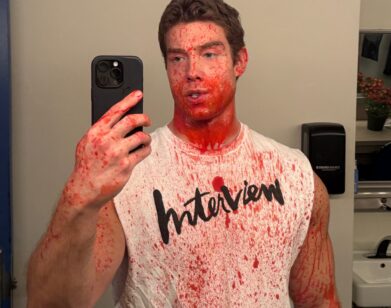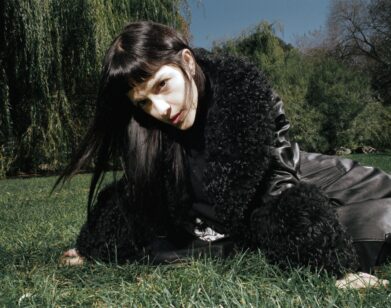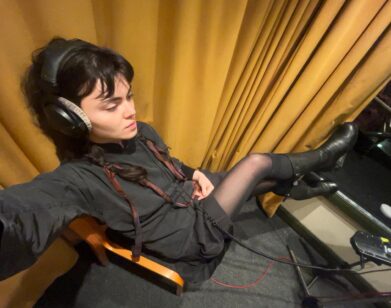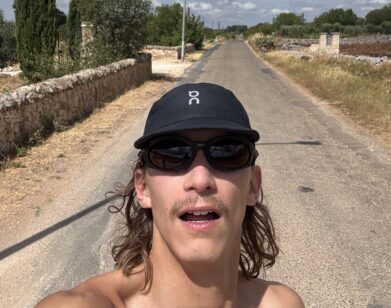Giacomo Gianniotti
GIACOMO GIANNIOTTI AT THE LINE HOTEL IN LOS ANGELES. PHOTOS: ZOEY GROSSMAN/ART DEPARTMENT. STYLING: DJUNA BEL/GIANT ARTISTS. GROOMING: ANNA BERNABE/ART DEPARTMENT FOR LEONOR GREYL AND ORLANE PARIS.
For a long-running series like Grey’s Anatomy, introducing a constant flow of charismatic new characters is perhaps more important than maintaining old favorites. In the same episode during which Doctor Derek Shepherd perished in a car accident (Season 11, Episode 23 for those who’ve fallen behind since the series premiered in 2002), a young surgical intern named Andrew DeLuca joined Seattle Grace. DeLuca’s appearance was an odd moment of portent; played by Giacomo Gianniotti, the character has very similar hair to that of Shepherd, one of the physical features that earned Shepherd the nickname “McDreamy.”
Although Gianniotti was initially hired as a guest star, in January the 26-year-old was promoted to a series regular. Tonight, Gianniotti will complete his first full season of the medical soap. “I’ve always been very nomadic,” he explains over the phone. “This is the first time I’ve actually settled down and been on a show for a while and felt like I had a regular job, which has been incredible from a stability standpoint, but also stressful because I always feel like I should be moving,” he continues. “When I’m still I get very antsy.”
Born in Rome to a Canadian artist mother and Italian musician father, Gianniotti split his childhood between the two continents. Earlier this year, he made his American film debut in the Jesse Owens biopic Race. In addition to acting, Gianniotti plays guitar, sings, and writes music (he is hoping to release some music next spring). He also owns a production company with a friend, and will begin shooting the company’s first film this summer. “In a world where often actors are depending heavily on others to give them a job, I’m excited about the idea of employing myself,” he says.
EMMA BROWN: Were you always bilingual?
GIANNIOTTI: Yeah, I grew up bilingual. I grew up speaking Italian with my father and his family, who are all Italian. My mom, after living there for 15 years, was fully fluent in Italian as well. When I moved to Canada, when I was starting kindergarten and grade one, I couldn’t really speak English quite yet. English was definitely my second language, but when you’re a kid you can absorb languages so quickly and without accents. My father, for example, speaks English just as well as the next guy but he has a very thick accent. You can tell that it’s not his first language.
BROWN: So you didn’t get bullied by the other kids for being different? No xenophobia?
GIANNIOTTI: Oh, I totally did. I got picked on a lot. The town where my mom moved to is called Parry Sound, Ontario. It’s a very small town, 6,500 people. There wasn’t a lot for kids to do and there wasn’t a lot of diversity in terms of race and religion. If you were anything different from white and protestant, you stuck out, and my name was Giacomo, which nobody could really pronounce or figure out, so people would always make fun of my name. I remember when I was young, it was a big part of me to assimilate and blend in. I didn’t want to viewed as different because it would draw attention. I asked everybody to call me Jack instead of Giacomo. Over the summer, my father, who was a waiter, would work and would send me to Italy to make sure I maintained my culture and my language, which is great and something I thank him for frequently. I would come back and teachers would be like, “Giacomo, tell the rest of the class what you did this summer,” and I would deny that I went to Italy and that I did anything interesting or different or extravagant. I just wanted to be like everyone else. Obviously as you get older you realize that that is a crock of shit and it’s beautiful and sets you apart.
BROWN: Were your friends suspicious: “Why didn’t we see you all summer?”
GIANNIOTTI: [laughs] Of course. My close friends knew, but for the rest of the class…I remember the roll call, the teacher would say the names like Susan, Bill, Nathan, John, Doug, and then there would always be this pregnant pause, and that’s when I would shoot my hand up and try to beat the teacher to butchering my name and having everyone laugh at it. I’d just say, “Giacomo! It’s Giacomo! That’s me.” Around 16, I moved to Toronto, which is a much bigger city, and I went to an arts high school there. Suddenly I was surrounded by people who were interested in the arts and playing music and acting and singing and drawing and painting and all of these creative things that, back home, no one was really interested in. I didn’t find a lot of parallels between my classmates [in Parry Sound]. It was lots of drugs, lots of drinking, and people going down the wrong roads, so I was happy to get out and go to a place where there was a bigger variety of cultures and creeds. I started listening to different music and playing music myself and just further pursuing all of the things that I was holding back, like my acting. Then I found other Italians with weird, fucked up names like me, so that was really great. They took me under their wing and I found a community. It was a really big change in my life when I hit 15 and I found that I wasn’t different; I was just in a place with no one really like me. That’s what changed my life. Then I fully embraced my culture and became proud of my name. To this day, I don’t let anybody call me anything other than Giacomo, because that’s my given name.
BROWN: I heard that you were briefly in an Italian movie when you were 10. How did that come about?
GIANNIOTTI: Yes, I was. My uncle was very good friends with a casting director there. They were just hanging out for a drink—I guess he had the misfortune of babysitting me at the time—and he was noticing that I would climb everything. I would climb fences, trees, roofs, ladders—anything I could jump off of. So his friend, this casting director, said, “I’m doing this movie right now and I need street kids who can get roughed up and not hurt themselves.” He asked me if I was interested in doing it, and I was 10, so I didn’t know what I was agreeing to, it just sounded like fun. So I had this little part in this film. These three street kids would wait outside this Chinese restaurant for a guy to come out to take out the trash, and every time he would do that, we’d pull his pants down or push him into the dumpster or just mess with him, and then we’d all runaway and hop up walls and over the fences, or slide under the fence.
BROWN: Were your parents excited about you playing a little hooligan in this movie?
GIANNIOTTI: I think, much like a dog that needed to be walked, they were excited that I had someone interested in getting this energy out of my system because I was so frantic.
BROWN: Was it this early film experience that first interested you in acting?
GIANNIOTTI: Yeah. I didn’t know much about acting. I thought that movies were these magical things that just happened. I didn’t notice the work and the behind the scenes of it all. I had such a good time and everybody said I was so natural, I decided to keep doing it. My parents put me in little acting classes and I did plays. When I moved to Toronto, I started taking it seriously because I was actually being challenged. I was at a school where there was an arts and drama program and I could take acting classes at the local theaters around the city. Then I moved back to Italy after high school to do some acting in Italian. After those two years, I came back to Toronto and attended a proper three-year acting conservatory university where I studied theater and took it very seriously.
BROWN: What was your first paid acting role?
GIANNIOTTI: I was in Italy, in Rome, where I’m from. I had an agent and I couldn’t get a job to save my life. In Italy we have accents—mine was very Roman, because I’m Roman—and they ask for a certain “Italiano pulito,” which means “clean Italian,” a sort of neutral, “I don’t really know where you’re from,” accent. That’s the accent you hear the actors in TV and film using. I’d never studied language in Italy; my schooling was all done in Canada in English. So as much as I could speak fluent Italian and I had a good vocabulary, I wasn’t able to shake my Roman accent, so I had to take some lessons in diction. Finally, I booked a plane ticket back to Toronto—I was fed up, “I’m not going to get a job”—and that’s when my agent called me saying, “You got this gig!” It was a guest star on this show called Medicina generale, which is a General Hospital rip-off, a medical drama. I played some street punk drug addict who lived under a bridge with a dog. I had a lot of fun doing that and it was my first check. I still have it. I kept it.
BROWN: I wanted to talk about Grey’s Anatomy. Was your character fully established when you auditioned?
GIANNIOTTI: No, no. I think they just needed fresh blood on the show; people that were going to shake things up and that had something different. I don’t know that they necessarily had grandiose plans for this character. I think they just wanted to bring on someone new who was interesting and well rounded. Shonda has had conversations with us about how the character ownership is kind of a 50-50 thing. As much as they write things for you, a lot of the things they come up with is from her watching us and watching how we translate the material. You really do have more control than you think in terms of how you try to play scenes and moments and where you chose to mine comedic bits that maybe aren’t there. They start to see what kind of an actor you are and what your strengths and weaknesses are and they start writing for you. When that happens on a show, it becomes very easy for you to just start crushing it because you’re working so in tandem with the writers. That moment of synergy is something very exciting.
BROWN: I know the preparation for surgical scenes in Grey’s Anatomy is very intense. What do you have to do?
GIANNIOTTI: We have a surgical nurse on set and she helps us break down the hierarchy of who’s in the room, who would be leading a surgery, who has the most experience. That is going to decide where you are placed and what you’d be qualified and able to do. Once we work that out, we map out this dance that we call surgery, and it really is a dance, because it’s a lot of repetitive movements and passing instruments to one another and perfect timing and making sure our hands aren’t bumping into each other and it’s all smooth. It’s complex, for sure. We rehearse it like a dance, we learn it, and then we perform it. What’s funny is that we almost have more rehearsal for that stuff than normal scenes. The dialogue scenes are pretty shoot-and-go. Everybody expects that everybody’s done their work. We do a blocking rehearsal and then we get maybe one or two takes, but for the surgical stuff, to keep that authenticity, it’s really well thought out and planned. I was lucky enough to be granted access to an actual open-heart surgery. I was able to be in the OR with another actor and observe. I learned a lot from there.
BROWN: Are you squeamish at all?
GIANNIOTTI: I thought I would be but I actually wasn’t. I went from being nervous to extremely fascinated. I was so engrossed in what they were doing and they were explaining everything and engaging us and we were asking them questions. It was an incredible experience. It was a six-and-a-half hour surgery— standing, no breaks. We thought it was hard and of course these surgeons were laughing at us saying that it was a joke and that they do 12- to 15-hour surgeries sometimes and then get on a plane and go do another 10-hour surgery somewhere else. These guys are beasts, they’re legends. I don’t know how they do what they do.
BROWN: I’ve heard that you are really into the Canadian film industry, and that you’re friends with filmmakers like Stephen Dunn.
GIANNIOTTI: Absolutely. We went to the same film conservatory. He was in the director’s lab and I was in the actor’s lab, so we got to collaborate on a few different things. He’s an incredible fellow. He’s having great success now and a lot of people are noticing it. I’m just excited about these up-and-coming filmmakers from Canada that are getting Canada heard. There’s a tremendous amount of talent there, and people are watching what’s coming out of Canada with Xavier Dolan, with Stephen Dunn. A lot of these films are getting a lot of critical acclaim, certainly on the festival circuit. It’s an exciting time to be in the Canadian filmmaking scene. I think we have to be very careful about the material we make; we have to set the right image for Canada and the right quality.
BROWN: What is the right image?
GIANNIOTTI: I think it’s a really young, diverse population with a lot of great stories of immigration and assimilation and artists and different refugees that have come over and triumphed over great struggle. Living in Toronto, you really see that every culture is represented and has made some kind of success. Whereas in Italy, it’s very black and white, the people who have money and are walking around in suits are Italians and the immigrants and refugees and people from other cultures are poor.
BROWN: I know you are also going to Everest basecamp in a few days.
GIANNIOTTI: I am. I’m doing a trek to the Everest basecamp. Twenty of us are tasked with raising money for this organization called All Hands Volunteers, which is an organization that it doing really, really incredible and detailed relief work all over the world and was one of the biggest supporters when the earthquake hit Nepal last year. They still have a lot of active camps and initiatives. It’s been a year since the earthquake hit, and a lot of people have forgotten about it, like a lot of people have forgotten about other sites that happened before. There is always incredible support and relief that floods in when something happens—it hits the news, everybody knows about it, people get involved, people donate —but it has a very finite timeline. Something else happens that takes the world’s eye somewhere else, but the reality is that that problem still exists and it’s still in need. The challenge for these organizations is, as the time passes, to keep people aware of it and keep people engaged in these efforts.
BROWN: How high up is basecamp? Have you done any climbing at all?
GIANNIOTTI: I did a lot of rock climbing and mountaineering when I was younger, but I’ve never done anything like this. I feel confident climbing and hiking, I think the real challenge for me is going to acclimatizing to the altitude. But I’m preparing; I’ve been hiking five days a week for two hours in Griffith Park carrying a weighted pack. It’s been going really well. I know it’s going to be difficult, but it’s going to be a really great experience.
THE SEASON 12 FINALE OF GREY’S ANATOMY AIRS TONIGHT, MAY 19, ON ABC.







